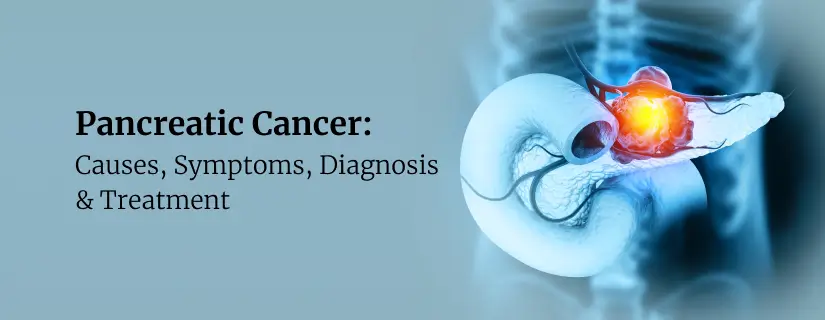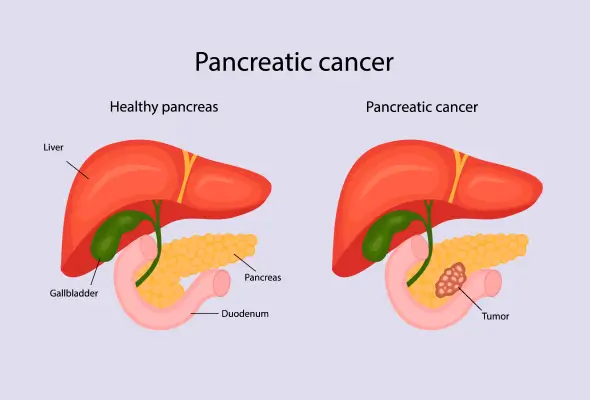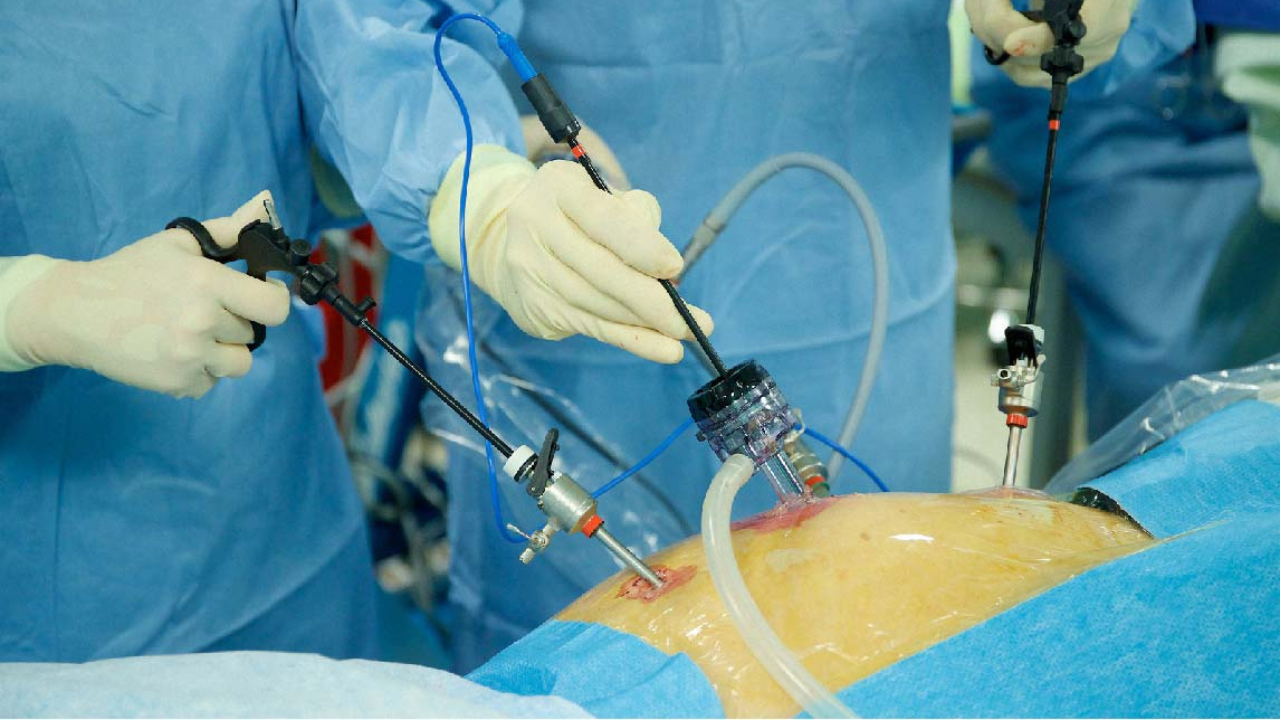Pancreatic Cancer: Symptoms, Causes, Diagnosis, Treatment & More
Pancreatic Cancer: Symptoms, Causes, Diagnosis, Treatment & More

Pancreatic cancer, though relatively rare in India, remains a significant health concern. Recent surveys indicate an incidence rate of approximately 0.5–2.4 cases per 100,000 men and 0.2–1.8 cases per 100,000 women. Consequently, early detection is crucial. Therefore, understanding the types, stages, symptoms, and prevention strategies is essential. In this article, we will guide you through recognizing and managing this serious health issue.
What is Pancreatic Cancer?
Pancreatic cancer is a serious medical condition where the cells in the pancreas—an organ aiding in digestion and blood sugar regulation—begin to grow uncontrollably. Consequently, detecting it early is challenging, as symptoms often manifest only in advanced stages. Therefore, it’s crucial to be vigilant for signs such as abdominal pain, weight loss, and jaundice. Moreover, seeking medical attention promptly is essential. In addition, regular check-ups and awareness of potential symptoms play a vital role in early detection, which can significantly improve treatment outcomes.

Types of Pancreatic Cancer
There are 4 types of pancreatic cancer, including:
- Adenocarcinoma: This is the most common type of pancreatic cancer, developing in the cells that line the pancreatic duct. Detecting it early is tough, and it tends to grow quickly, making timely intervention crucial.
- Neuroendocrine Tumors (NETs): Less common; these tumours can either produce hormones (functional) or not (non-functional). They typically grow at a slower pace than adenocarcinomas.
- Cystic Lesions: These are fluid-filled sacs in the pancreas, and while most are harmless, some can turn cancerous. Regular check-ups are essential to monitor their development.
- Acinar Cell Carcinoma: A rare type, starting in the cells responsible for producing digestive enzymes. Its behaviour is different from the more common adenocarcinoma.
Stages of Pancreatic Cancer
- Stage I: At the start, cancer is only in the pancreas. Surgery is often an option for effective removal.
- Stage II: Cancer may reach nearby tissues but not major blood vessels. Treatment options like surgery are considered effective.
- Stage III: The cancer has progressed to major blood vessels. A comprehensive approach with surgery, chemotherapy, and radiation may be recommended.
- Stage IV: In this advanced stage, cancer has spread to distant organs. The focus shifts to improving the patient’s quality of life and managing symptoms. Stage IV is considered the end stage of pancreatic cancer.
Symptoms of Pancreatic Cancer
Here are the symptoms of pancreatic cancer.
- Digestive Issues: Changes in bowel habits, such as light-coloured stools or dark urine.
- Jaundice: Yellowing of the skin and eyes due to bile duct blockage, a sign often observed in pancreatic cancer.
- Unintended Weight Loss: Losing weight without trying, which may be noticeable.
- Abdominal Pain: Persistent pain in the abdomen or back, often a common early symptom.
- Loss of Appetite: A decrease in the desire to eat, potentially leading to weight loss.
- New-Onset Diabetes: The development of diabetes without a clear explanation.
- Fatigue: Feeling unusually tired or weak, which can be attributed to the cancer affecting the body.
These symptoms, especially when persistent, should prompt consultation with a healthcare professional for further evaluation and diagnosis. Early detection is crucial for effective management of pancreatic cancer.
Causes of Pancreatic Cancer
- Smoking
- Family History of pancreatic cancer
- Chronic Pancreatitis: Long-term inflammation of the pancreas may elevate the risk
- Age: Pancreatic cancer is more common in older adults
- Overweight or obesity
- Uncontrolled Diabetes
- Dietary Factors: A diet high in red and processed meats may contribute to pancreatic cancer.
- Occupational Exposure: Certain occupations, such as those involving chemicals and petroleum, may be associated
What are the Complications Associated with Pancreatic Cancer?
As pancreatic cancer grows, it can cause complications such as:
- Spread to Nearby Organs: Pancreatic cancer can spread to neighbouring organs, complicating treatment.
- Blockage of the Digestive System: Tumours may block ducts, causing digestive issues and affecting nutrient absorption.
- Jaundice: Yellowing of skin due to bile duct blockage is a common complication.
- Blood Vessel Involvement: Advanced cases may affect major blood vessels, posing additional challenges for treatment.
- Diabetes Development: Pancreatic cancer can lead to new-onset diabetes, adding to health complications.
- Pain and Discomfort: Tumors can cause persistent abdominal pain, impacting the patient’s quality of life.
Diagnostic Tests of Pancreatic Cancer
- Imaging Tests: CT Scan, MRI, Ultrasound: Visualize the pancreas for abnormalities.
- Blood Tests: CA 19-9, Liver Function: Check for markers indicating pancreatic issues.
- Biopsy: Fine Needle Aspiration (FNA): Extracts tissue for microscopic examination.
- Endoscopic Tests: EUS, ERCP: Use endoscopy for detailed pancreas imaging.
- Laparoscopy: Direct Visualization: A camera examines the pancreas through a small incision.
These tests aid in diagnosing pancreatic cancer, guiding for the appropriate treatment approach. If symptoms arise, prompt medical attention ensures timely intervention.
Prevention of Pancreatic Cancer
Prevention is always better than cure. Here are tips you can follow to prevent pancreatic cancer.
- Quit Smoking
- Maintain a Healthy Weight
- Eat a Balanced Diet
- Limit Alcohol Consumption
- Stay Active
- Manage Diabetes
- Know Your Family History
- Protect Against Occupational Risks
- Consider Genetic Counseling in cases of a family history of pancreatic cancer
Treatment of Pancreatic Cancer
Here’s the treatment procedure for pancreatic cancer
- Diagnosis: The initial step involves a series of tests, such as CT scans and biopsies, to confirm the presence of pancreatic cancer.
- Surgery: Depending on cancer’s stage, surgical procedures may be performed to remove the pancreatic cancer tumour, either partially or entirely, with the option of removing the whole pancreas.
- Chemotherapy: Powerful drugs are utilized to eliminate cancer cells. This treatment can be administered before or after surgery to target any remaining cancer cells.
- Radiation Therapy: High-energy rays are directed at the cancer cells to destroy them. This therapy is often combined with surgery or chemotherapy for a more comprehensive approach.
- Targeted Therapy: Medications are employed to specifically target molecules involved in cancer growth, minimising harm to healthy cells.
- Immunotherapy: This treatment enhances the body’s immune system, empowering it to combat cancer cells more effectively.
- Palliative Care: Focused on alleviating symptoms and enhancing the overall quality of life, especially in the advanced stages of the disease.
- Clinical Trials: Participation in research studies exploring new treatments, aiming to advance medical understanding and improve patient outcomes.
Conclusion
Recognising symptoms, staying healthy, and seeking early treatment are key steps in effectively fighting pancreatic cancer. Doctors tend to use personalised approaches, like surgery and innovative treatments, aiming for better outcomes. Palliative care and keeping the patients motivated is an effective way to enhance the patient’s quality of life. Making informed choices and staying proactive are vital in the fight against pancreatic cancer.
You May Also Like
Laparoscopic Cancer Surgery: A Minimally Invasive Breakthrough in Oncologic Care Laparoscopic Cancer Surgery: A Minimally …
Early signs of thyroid cancer- by Dr. Vijay Jagad Early signs of thyroid cancer- by …
Understanding Colon Cancer: Symptoms, Causes, and Diagnosis Understanding Colon Cancer: Symptoms, Causes, and Diagnosis Updated …



